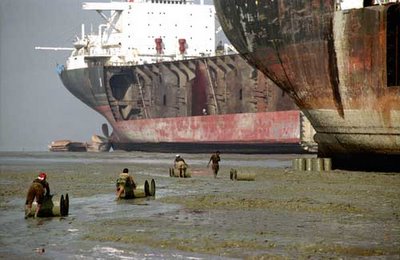
At the Chittagong shipbreaking yard in Bangladesh, supertankers from all over the world are disassembled by low-income laborers, under amazingly dangerous conditions.
Previously, shipbreaking operations were performed primarily in the United States and Europe (in the 1960s, Scotland had the largest shipbreaking facility in the world). But as costs and regulations increased in wealthy countries, operations gradually shifted to dirt-poor countries without environmental or labor laws. The situation at Chittagong is particularly bad; for one thing, it tends to get more than its fair share of oil tankers, which are generally shunned by other countries. As you might imagine, ship owners often decline to clean toxic liquids and gases from the ships, or to warn workers about these hazards.
Shipbreaking is a good example of the horrific practices that can lurk behind the feel-good term "recycling." The International Maritime Organization has recommended a "maker to breaker" system, in which new ships would be designed to make demolition safer and easier. But with roughly 700 ships reaching the end of their lifespan each year, it'll be quite some time before such policies trickle down to regions like Chittagong.
I bring this topic up because the photographer Brenden Corr has a fascinating series on Chittagong in the current issue of Foreign Policy. That said, it can't compare to this haunting photographic survey by Edward Burtynsky.
UPDATE: I fixed the broken FP link, thanks to a tip from Sharl.
Tuesday, January 17, 2006
Shipbreaking
Posted by
Phila
at
12:07 PM
![]()
Subscribe to:
Post Comments (Atom)
3 comments:
I think the following link is what you wanted for the Foreign Policy reference:
http://www.foreignpolicy.com/story/cms.php?story_id=3349&fpsrc=ealert060104
Thanks for this post; very interesting. I have a tangential involvement with hull coatings, and I hate to think how much exposure these folks are having to tributyltin (TBT) and other biocides used in antifouling hull coatings. A worldwide total ban on coatings that release TBT (overwhelmingly consisting of the so-called self-polishing/ablative types of coatings) becomes effective in 2008, but that stuff will be in the environment for a very long time thereafter, as will other nasties.
sharl
Thanks, Sharl...I'll fix the link right now.
Re TBT, that's a good - if gruesome - point...I hadn't thought of that.
If it were up to me, virtually all use of organometals would cease as of today. They're one of my least favorite groups of chemicals, all things considered.
Post a Comment